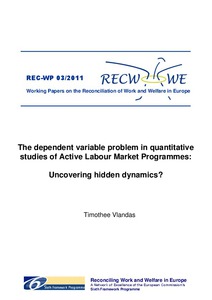The dependent variable problem in quantitative studies of active labour market programmes: uncovering hidden dynamics?
"The question of what explains variation in expenditures on Active Labour Market Programs (ALMPs) has attracted significant scholarship in recent years. Significant insights have been gained with respect to the role of employers, unions and dual labour markets, openness, and partisanship. Howev...
| Main Authors: | , |
|---|---|
| Institution: | ETUI-European Trade Union Institute |
| Format: | TEXT |
| Language: | English |
| Published: |
Edinburgh
2011
RECWOWE |
| Subjects: | |
| Online Access: | https://www.labourline.org/KENTIKA-19177299124919954719-The-dependent-variable-problem.htm |
| Summary: | "The question of what explains variation in expenditures on Active Labour Market Programs (ALMPs) has attracted significant scholarship in recent years. Significant insights have been gained with respect to the role of employers, unions and dual labour markets, openness, and partisanship. However, there remain significant disagreements with respects to key explanatory variables such the role of unions or the impact of partisanship.
Qualitative studies have shown that there are both good conceptual reasons as well as historical evidence that different ALMPs are driven by different dynamics. There is little reason to believe that vastly different programs such as training and employment subsidies are driven by similar structural, interest group or indeed partisan dynamics. The question is therefore whether different ALMPs have the same correlation with different key explanatory variables identified in the literature? Using regression analysis, this paper shows that the explanatory variables identified by the literature have different relation to distinct ALMPs. This refinement adds significant analytical value and shows that disagreements are at least partly due to a dependent variable problem of ‘over-aggregation’." |
|---|---|
| Physical Description: | 31 p. Digital |

